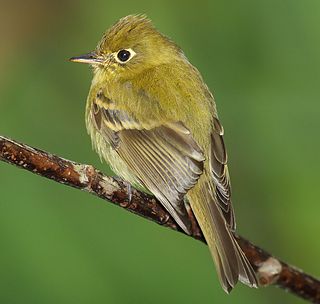 W
WThe tyrant flycatchers (Tyrannidae) are a family of passerine birds which occur throughout North and South America. They are considered the largest family of birds known to exist in the world, with more than 400 species. They are the most diverse avian family in every country in the Americas, except for the United States and Canada. The members vary greatly in shape, patterns, size and colors. Some tyrant flycatchers may superficially resemble the Old World flycatchers, which they are named after but are not closely related to. They are members of suborder Tyranni (suboscines), which do not have the sophisticated vocal capabilities of most other songbirds.
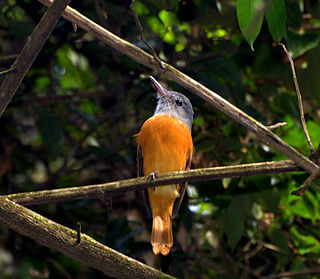 W
WAttila is a genus of tropical passerine birds, the attilas. They belong to the tyrant flycatcher family. The species in this genus have large heads and hooked bills; they are markedly predatory and aggressive for their size – hence the scientific and common names, which refer to Attila the Hun.
 W
WThe black-chested tyrant is a species of bird in the family Tyrannidae. It is found in Brazil, Suriname, and Venezuela. It is placed in the monotypic genus Taeniotriccus by most ornithologists, although it has formerly been in the genus Poecilotriccus.
 W
WThe boat-billed flycatcher is a passerine bird. It is a large tyrant flycatcher, the only member of the monotypic genus Megarynchus.
 W
WThe cattle tyrant is a species of bird in the tyrant-flycatcher family Tyrannidae. In Brazil, it is called suiriri-cavaleiro. It is the only member of the genus Machetornis. The relationships of this species and genus to other genera in the tyrant flycatchers are uncertain. It resembles Tyrannus flycatchers, but this may be the result of convergence. Three subspecies are recognised, the nominate race, M. r. flavigularis and M. r. obscurodorsalis, although the latter two may not be distinct from M. r. flavigularis. The genus name was given to the species by George Robert Gray and is derived from the Ancient Greek makhētēs for fighter and ornis for bird, a reference to its pugnacious behaviour and habit of dispossessing other species of their nests. The specific name comes from the Latin rixosus meaning quarrelsome, again referring to the behaviour and temperament of the species.
 W
WThe cinnamon flycatcher is a species of bird in the family Tyrannidae. It is the only member of the genus Pyrrhomyias.
 W
WThe cinnamon neopipo or cinnamon manakin-tyrant is a species of bird in the family Tyrannidae. It is the only member of the genus Neopipo.
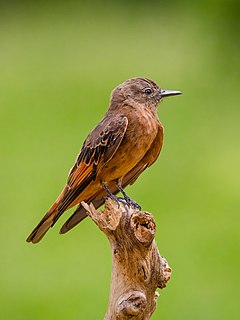 W
WThe cliff flycatcher is a species of bird in the tyrant flycatcher family, Tyrannidae. The cliff flycatcher is the only species in the genus Hirundinea after the swallow flycatcher was merged, becoming subspecies Hirundinea ferruginea bellicosa. It is native to South America, where its natural habitats are cliffs and crags in the vicinity of subtropical or tropical dry forest, subtropical or tropical moist lowland forest, subtropical or tropical moist montane forest, and heavily degraded former forest.
 W
WThe Cocos flycatcher is a species of bird in the family Tyrannidae, and the only species in the genus Nesotriccus.
 W
WThe crowned slaty flycatcher is a species of bird in the family Tyrannidae, the tyrant flycatchers. It was formerly united in the genus Empidonomus with the variegated flycatcher, but is now considered the only species of Griseotyrannus. The name Griseotyrannus aurantioatrocristatus means "orange-black crested gray Tyrannus".
 W
WThe drab water tyrant is a species of bird in the family Tyrannidae, the tyrant flycatchers, and is the only species in the monotypic genus Ochthornis. It is found in Bolivia, Brazil, Colombia, Ecuador, French Guiana, Guyana, Peru, and Venezuela, where its natural habitat is rivers.
 W
WThe fire-eyed diucon is a passerine bird of South America belonging to the tyrant flycatcher family Tyrannidae. It is the only species placed in the genus Pyrope.
 W
WThe fuscous flycatcher is a small passerine bird in the tyrant flycatcher family, and the only member of the genus Cnemotriccus. It breeds from Colombia and Venezuela south to Bolivia, Paraguay and Argentina, and on both Trinidad and Tobago. The fuscous flycatcher ranges in northern and eastern South America, including the entire Amazon Basin, and the Guianas; also all of Brazil except the very southeastern border area with Uruguay.
 W
WThe grey monjita is a species of bird in the family Tyrannidae that is the only member of the genus Nengetus. It is found in Argentina, Bolivia, Brazil, Paraguay, Peru, Suriname, and Uruguay. Its natural habitats are dry savanna, subtropical or tropical seasonally wet or flooded lowland grassland, and pastureland.
 W
WThe grey-and-white tyrannulet is a species of bird in the tyrant flycatcher family Tyrannidae. It is the only species placed in the genus Pseudelaenia. It is found in Ecuador and Peru, where natural habitats are subtropical or tropical dry shrubland and subtropical or tropical moist shrubland.
 W
WThe kinglet calyptura is a small passerine bird. It is the only member of the genus Calyptura in the family Tyrannidae. It had traditionally been considered a member of the family Cotingidae. It is endemic to Atlantic forest in south-eastern Brazil. For a long time this species was feared to be extinct, as it went unrecorded during the 20th century until two birds were observed in Serra dos Órgãos on several days in October 1996. Since these sightings, there have not been any confirmed records, although at least one recent—but unconfirmed—record exists from near Ubatuba. Consequently, it is considered Critically Endangered by BirdLife International.
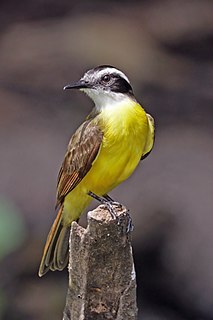 W
WThe lesser kiskadee is a species of passerine bird in the family Tyrannidae. It is the only species in the genus Philohydor. It is found in Argentina, Bermuda, Bolivia, Brazil, Colombia, Ecuador, French Guiana, Guyana, Panama, Peru, Suriname, Trinidad, Guatemala, and Venezuela. Its natural habitats are subtropical or tropical moist shrubland and swamps.
 W
WThe little ground tyrant is a species of bird in the family Tyrannidae, the tyrant flycatchers and is the only species placed in the genus Syrtidicola. It is found in Amazonian Brazil, Peru, and Bolivia; also smaller regions of Colombia and Ecuador. Its natural habitats are subtropical or tropical moist shrubland and rivers.
 W
WThe long-tailed tyrant is a species of bird in the family Tyrannidae, the only member of genus Colonia.
 W
WThe many-colored rush tyrant or many-coloured rush tyrant is a small passerine bird of South America belonging to the tyrant flycatcher family, Tyrannidae. It is the only member of the genus Tachuris and is sometimes placed in a separate monotypic family. It inhabits marshland and reedbeds around lakes and rivers. It is particularly associated with stands of Scirpus. The nest is built among plant stems.
 W
WMegarynchus is a genus of bird in the family Tyrannidae. It is currently considered to be a monotypic genus.
 W
WThe black-and-white monjita is a species of passerine bird in the family Tyrannidae. It is found in Argentina, Brazil, Uruguay, and possibly Paraguay.
 W
WMyiopagis is a genus of bird in the family Tyrannidae, the tyrant flycatchers. These species are closely related to the genus Elaenia but are generally smaller.
 W
WOchthoeca is a genus of South American birds in the tyrant flycatcher family Tyrannidae.
 W
WThe pale-eyed pygmy tyrant is a species of bird in the tyrant flycatcher family, Tyrannidae, where it makes up the monotypic genus Atalotriccus.
 W
WThe Patagonian tyrant is a species of bird in the family Tyrannidae, the only one in the genus Colorhamphus. It is found in Argentina and Chile. Its natural habitat is temperate forests. Though it is a primarily insectivorous species, it has been seen also to eat the seeds of mayten and the fruit of leñadura.
 W
WThe lesser kiskadee is a species of passerine bird in the family Tyrannidae. It is the only species in the genus Philohydor. It is found in Argentina, Bermuda, Bolivia, Brazil, Colombia, Ecuador, French Guiana, Guyana, Panama, Peru, Suriname, Trinidad, Guatemala, and Venezuela. Its natural habitats are subtropical or tropical moist shrubland and swamps.
 W
WThe genus Sayornis is a small group of medium-sized insect-eating birds, known as phoebes, in the tyrant flycatcher family Tyrannidae.
 W
WPhyllomyias is a genus of small birds in the tyrant-flycatcher family Tyrannidae. They are found in wooded habitats of Central and South America. Some species are among the commonest birds in their range, while other are rare and threatened. They have a short, stubby bill, are greenish above, yellowish or whitish below, and all except the sooty-headed tyrannulet have pale wing-bars or edging. They feed on small arthropods and fruits. Most species regularly take part in mixed species flocks.
 W
WPhylloscartes is a genus of small birds in the family Tyrannidae. They are found in wooded habitats of Central and South America. They mainly feed on small arthropods, and most commonly take part in mixed species flocks. The mottled-cheeked tyrannulet is among the commonest birds in its range, but several other species are rare and threatened. Their plumage is predominantly green, yellow, white and grey, and many have contrasting facial patterns and wing-bars. They have thin, pointed bills, and relatively long tails. Most frequently cock their tail, perch relatively horizontally and are very active.
 W
WThe piratic flycatcher is a passerine bird, the only member of the genus Legatus. It is a resident breeder from southern Mexico and Trinidad south to Bolivia and Argentina. At least some birds from Central America and Trinidad are migratory, and this species also visits Tobago.
 W
WRhytipterna is a genus of bird in the tyrant flycatcher family Tyrannidae. They share the common name "mourner" with several species in the family Tityridae.
 W
WThe sharp-tailed grass tyrant is a species of bird in the family Tyrannidae, the only one in the genus Culicivora.
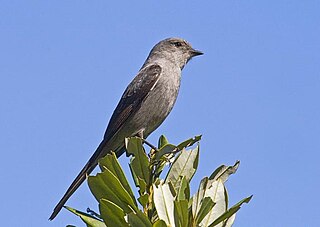 W
WThe shear-tailed grey tyrant is a species of bird in the family Tyrannidae, in the monotypic genus Muscipipra. It is found in southeastern Brazil, eastern Paraguay and far northeastern Argentina, where its natural habitats are subtropical or tropical moist lowland forest, subtropical or tropical moist montane forest, and heavily degraded former forest.
 W
WThe short-tailed field tyrant is a species of bird in the family Tyrannidae. It is monotypic within the genus Muscigralla. It is found in Ecuador, Peru and far northern Chile where its natural habitats are subtropical or tropical dry shrubland and pastureland.
 W
WThe spectacled tyrant is a species of bird in the family Tyrannidae, the only one in the genus Hymenops.
 W
WThe streamer-tailed tyrant is a species of bird in the family Tyrannidae, the only one in the genus Gubernetes.
 W
WThe sulphury flycatcher is a passerine bird which is a localised resident breeder from Trinidad, the Guianas and Venezuela south to Amazonian Peru, northern Bolivia and Brazil.
 W
WThe tit-tyrants are a group of small, mainly Andean, tyrant flycatchers found in the genera Anairetes and Uromyias.
 W
WTraill's flycatcher was a supposed species of tyrant flycatcher in the genus Empidonax, called Empidonax traillii. It was named by John James Audubon after his good British friend Thomas Stewart Traill.
 W
WThe Tumbes tyrant is a species of bird in the family Tyrannidae. It is monotypic within the genus Tumbezia. It is endemic to Peru, where its natural habitats are subtropical or tropical dry forest, subtropical or tropical moist lowland forest, and subtropical or tropical dry shrubland. It is threatened by habitat loss.
 W
WThe variegated flycatcher is a species of bird in the family Tyrannidae. With the crowned slaty flycatcher being moved to its own genus, this is now the only species remaining in Empidonomus.
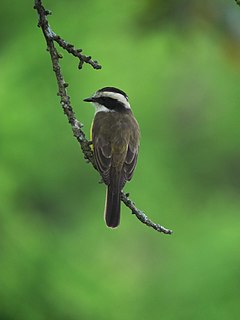 W
WThe white-bearded flycatcher is a species of bird in the family Tyrannidae. It is the only member of the genus Phelpsia. It is found in Colombia and Venezuela.
 W
WThe white-headed marsh tyrant, also known as simply the marsh tyrant, is a small passerine bird in the tyrant flycatcher family, the only species of the genus Arundinicola. It breeds in tropical South America from Colombia, Venezuela and Trinidad south to Bolivia, Argentina and Paraguay.
 W
WThe yellow tyrannulet is a very small passerine bird in the tyrant flycatcher family. It breeds from Nicaragua south to northeastern Argentina and southeastern Brazil. It is the only member of the genus Capsiempis, but its taxonomy is uncertain, and it has been allocated to at least three other genera in the past.
 W
WThe yellow-browed tyrant is a species of bird in the family Tyrannidae. It is monotypic within the genus Satrapa. It is found in Argentina, Bolivia, Brazil, Colombia, Paraguay, Peru, Uruguay, and Venezuela, where its natural habitats are subtropical or tropical moist lowland forests, pastureland, and heavily degraded former forest.
 W
WThe yellow-crowned tyrannulet is a species of bird in the family Tyrannidae. It is monotypic within the genus Tyrannulus. It is found in Bolivia, Brazil, Colombia, Costa Rica, Ecuador, French Guiana, Guyana, Panama, Peru, Suriname, and Venezuela, where its natural habitats are subtropical or tropical moist lowland forest, subtropical or tropical swamps, and heavily degraded former forest.